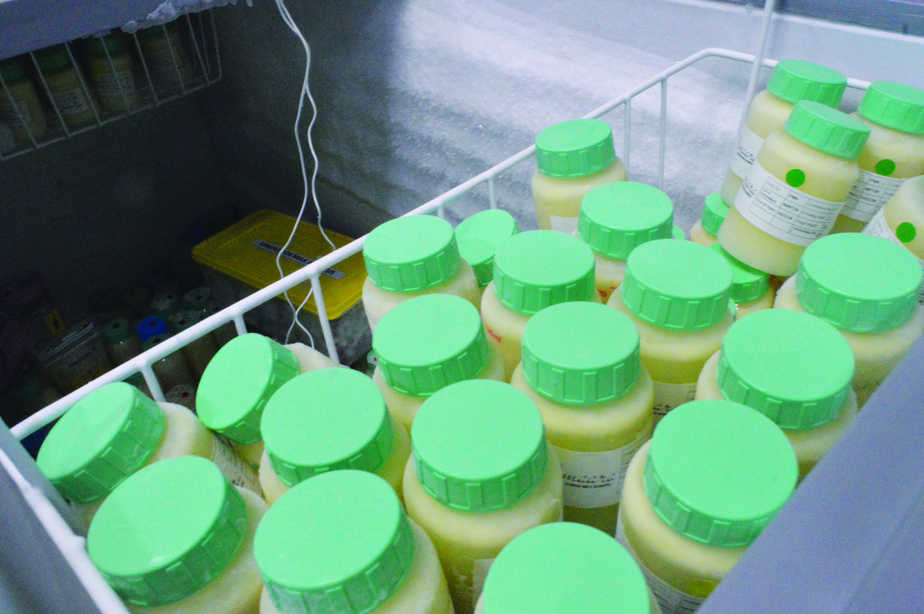
Salma (name changed) had her first child when she was 19 years old. Her baby was delivered prematurely three months before the expected date. Since she hadn’t started lactating, she couldn’t breastfeed her baby. The baby was given an artificial mixture for nourishment, instead of breast milk. But a month later, the baby died.
This is not just an isolated incident. According to a report published by the United Nations (UN), over one lakh children under the age of five died due to diseases that could have been prevented, had they been provided with breast milk. “A large number of premature babies are born in India, and the mothers of these babies have underdeveloped breasts that do not lactate properly. Such babies do not receive proper nutrition, and die”, says Dr Neepa Ghosh, a gynaecologist. “If there are a number of breast milk banks that preserve breast milk for these babies, then the chances of such deaths will decrease considerably”, she adds.
Amaara, India’s first private breast milk bank, was set up last year in Delhi’s Fortis La Femme Hospital in Greater Kailash II. “A large number of babies in the country are malnourished due to the lack of breast milk. We started our bank to help those children get proper nutrition”, says Dr Raghuram Mallaiah, Director of Neonatology at Fortis La Femme and founder of Amaara Milk Bank. “Breast milk is very helpful for the baby as it acts as a natural vaccine against diseases like diarrhoea and gastroenteritis. It also protects the baby from different types of allergies”, adds Rajan.
“Our milk banks mainly help premature babies and those who have undergone a major operation after birth. There are a large number of newborn babies, mostly premature, who have to undergo major operations like an open heart surgery. These babies cannot be fed breast milk directly from the mother and are fed artificial mixtures as a replacement for breast milk, which are very harmful”, says Mallaiah. “We provide breast milk to those babies as well, so that they can get proper nutrition during the post-surgery period”, he adds.
“First we collect milk from the donor, but we do not give that milk directly to the baby. Since it has to be stored and preserved for a long period of time, we pasteurise it.We store the pasteurised milk in a freezer at a temperature of -20 degrees Celsius. Only after following this procedure, do we give it to the babies”, says Mallaiah. “The breast milk can only be stored for a period of six months”, he adds. He says that a woman can only become a donor after a team from Amaara conducts a full test, both physical and psychological, to check whether she is fit to be a donor.
Singapore-based management consultant Rakhi Saini says that her baby was born premature at 29 weeks. For about a fortnight, Saini was not lactating. Her doctor suggested that she take the help of a breast milk bank. Then she went to Amaara. “I was extremely worried about my baby, but the milk from the bank gave him a new life”, says Saini. Now, a regular donor at the bank herself, she says, “Someone’s milk saved my baby’s life, and now I am doing my bit to save lives of such babies”.
Rama (name changed) is a regular donor at a milk bank in Udaipur. She got married when she was 18 years old and gave birth to twins when she was 20. She could not breastfeed them as she was not lactating, and both her children died due to malnutrition. At the age of 25, when she was expecting her third child, she came to know about the milk bank and became a donor. “I had lost my children due to this problem, and I don’t want any other child to suffer the same fate”, she says. But my family doesn’t know about this and if they come to know about it someday, they would disapprove of it,” she adds.
A survey conducted by the World Health Organisation (WHO) found that in 2017 India had the most premature babies. “More breast milk banks should come up across the country so that these babies can get proper nutrition”, says Ghosh. Even though the first breast milk bank in Asia was established in Sion Hospital in Mumbai, India is still far behind countries like USA where there are over a thousand breast milk banks. Even South Africa has around 250 whereas India only has around 25-30 milk banks. “Most of these milk banks are run by government organisations and provide their service only to the hospital it is affiliated to, unlike us, who provide milk to babies in all hospitals”, says Dr Mallaiah.
Lack of donors is a major obstacle for these milk banks. “On an average, we get three to four donors a month, and sometimes we do not have donations for a long period of time”, says Oshika Chakraborty, manager at the Amaara Milk Bank. “The samples do not last for more than six months, and sometimes we have so few samples, that we run out of them due to high demand”, says Dr. Mallaiah. “We expect more women to come forward and donate to milk banks, so that we can save more premature babies from malnourishment”, concludes Mallaiah.
On the principle of 'Sarvajan Hitaya, Sarvajan Sukhaya' -- Welfare for all, Happiness for all…
With hundreds reported missing in Delhi this year, this guide explains how families can use…
The case came to light after a 35-year-old woman from Panipat alleged that she had…
During the investigation, CCTV footage helped identify the suspects, according to Delhi Police
The launch took place during the inauguration of the Delhi Police Exhibition Hall at Connaught…
The 28-year-old factory owner was taken to Satyawadi Raja Harish Chandra Hospital in Delhi, while…